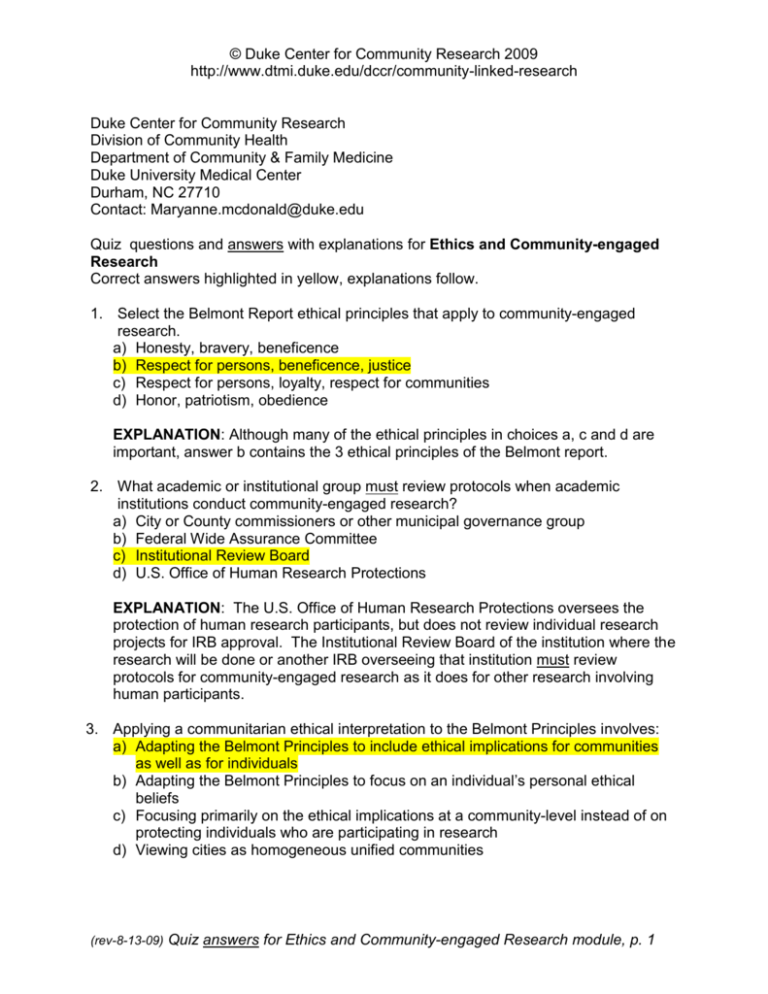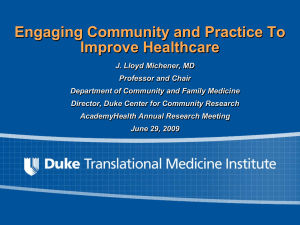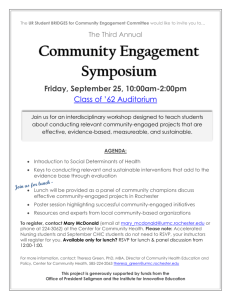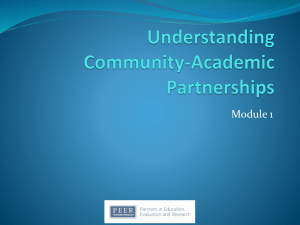Document
advertisement

© Duke Center for Community Research 2009 http://www.dtmi.duke.edu/dccr/community-linked-research Duke Center for Community Research Division of Community Health Department of Community & Family Medicine Duke University Medical Center Durham, NC 27710 Contact: Maryanne.mcdonald@duke.edu Quiz questions and answers with explanations for Ethics and Community-engaged Research Correct answers highlighted in yellow, explanations follow. 1. Select the Belmont Report ethical principles that apply to community-engaged research. a) Honesty, bravery, beneficence b) Respect for persons, beneficence, justice c) Respect for persons, loyalty, respect for communities d) Honor, patriotism, obedience EXPLANATION: Although many of the ethical principles in choices a, c and d are important, answer b contains the 3 ethical principles of the Belmont report. 2. What academic or institutional group must review protocols when academic institutions conduct community-engaged research? a) City or County commissioners or other municipal governance group b) Federal Wide Assurance Committee c) Institutional Review Board d) U.S. Office of Human Research Protections EXPLANATION: The U.S. Office of Human Research Protections oversees the protection of human research participants, but does not review individual research projects for IRB approval. The Institutional Review Board of the institution where the research will be done or another IRB overseeing that institution must review protocols for community-engaged research as it does for other research involving human participants. 3. Applying a communitarian ethical interpretation to the Belmont Principles involves: a) Adapting the Belmont Principles to include ethical implications for communities as well as for individuals b) Adapting the Belmont Principles to focus on an individual’s personal ethical beliefs c) Focusing primarily on the ethical implications at a community-level instead of on protecting individuals who are participating in research d) Viewing cities as homogeneous unified communities (rev-8-13-09) Quiz answers for Ethics and Community-engaged Research module, p. 1 © Duke Center for Community Research 2009 http://www.dtmi.duke.edu/dccr/community-linked-research EXPLANATION: The Belmont Principles focus on the protection of individuals. Using a communitarian ethical interpretation these principles can be understood as protecting communities as well. Read the following case and select the correct answers to questions 4 and 5. At the invitation of several community organizations University researchers conducted a community-engaged research project to measure human exposure to toxins in a community near a factory. Individual participants had their water tested and their blood drawn to measure toxin exposure and received confidential test results. Risks to individuals were minimal and were outweighed by the potential benefits to each individual to receive care and assistance to reduce further exposure to toxins—if toxin levels were found to be high. Risks for the community were indirect. If there are high levels of the toxin in the water or in participants’ blood, people may think of the community as an undesirable place. This could damage the community’s reputation, and have an affect on individuals who did not participate in the study. Yet exposure data can help communities work with regulatory agencies to enforce regulations to stop the discharge of toxins, clean up the contamination and bring lawsuits against the responsible companies: a benefit. In this case study: 4. Risks to the community a) are the same as those to individuals b) do not need to be discussed with community organizations or agencies representing the community c) should not be considered since this study is pure science d) must be weighed against the benefits for the community EXPLANATION: In this case study risks to the community are different than those posed to individuals. These risks and any benefits should be discussed with community organizations and agencies prior to the start of the study. Community members can weigh the risks against the benefits. 5. Individuals (based on the case study) a) who are tested have few risks, and there is the possibility that the community may benefit. b) who are tested have few risks and no opportunity to benefit as individuals. c) who do not enroll in the study will experience only benefits d) Do not need to sign a consent form if all the community organizations have made a decision to participate in the study. (rev-8-13-09) Quiz answers for Ethics and Community-engaged Research module, p. 2 © Duke Center for Community Research 2009 http://www.dtmi.duke.edu/dccr/community-linked-research EXPLANATION: Even if community organizations have decided to participate in a study, individuals must still sign consent forms. Answer a is correct, there is very little individual risk in getting tested and the community may benefit from the results. END OF CASE STUDY QUESTIONS 6. Researchers conducting community-engaged studies need to learn the values and ethics of the communities they plan to work with because— a) Researchers must make sure that community values and ethics are the same as their own. b) People are really all the same and in a real collaborative partnership differences in values and ethics do not matter. c) Not understanding a community’s values and ethics can lead to misunderstandings, mistrust and harm. d) Researchers need to determine how best to educate the community to correct their inaccurate ethical beliefs and outdated values. EXPLANATION: Communities have their own ethics and values and researchers working with a community, no matter how collaborative the partnership, need to understand and respect them. 7. Which of the following reasons explain why some community organizations have established their own research approval processes? a) To ensure that research efforts within the community will result in papers published in academic journals. b) To determine which researchers work with their community and how the research will be conducted. c) Because they do not know that most universities have IRBs d) They want full and complete control of any research EXPLANATION: Many communities have felt exploited by researchers in the past and so have formed their own research approval processes in order to have some control over who works with members of the community and how the research will be conducted. 8. Partnerships among researchers and community organizations a) Can only be considered fair if all organizations control the same amount of funding b) Often have the same patterns of power as the larger society. c) Are practical only if the researchers control all aspects of the research process d) Require researchers to always follow community advice. (rev-8-13-09) Quiz answers for Ethics and Community-engaged Research module, p. 3 © Duke Center for Community Research 2009 http://www.dtmi.duke.edu/dccr/community-linked-research EXPLANATION: Partnerships often reflect the same patterns of power found in the larger society. A partnership involves negotiation and compromise, answers c and d give ultimate control to one group or another. 9. In a community-engaged partnership if one group controls all of the funding a) It is impossible to have a fair and strong partnership. b) The other groups must let the group with the funding make all the important decisions. c) All members must recognize the important contributions of each group so that all contributions are valued. d) The contributions of the organizations without the funding isn’t important. EXPLANATION: Funding is only one part of what makes a research project successful; many other contributions are essential. In a partnership all members need to see the value of all contributions. 10. A Memorandum of Understanding or MOU can a) Clarify the responsibilities of each organization in the partnership. b) Be a substitute for an IRB application. c) Be used instead of a Community Advisory Board. d) All of the above. EXPLANATION: A Memorandum of Understanding does not take the place of an IRB application or a Community Advisory Board. Instead a MOU can clarify responsibilities and propose methods for settling disagreements. (rev-8-13-09) Quiz answers for Ethics and Community-engaged Research module, p. 4








